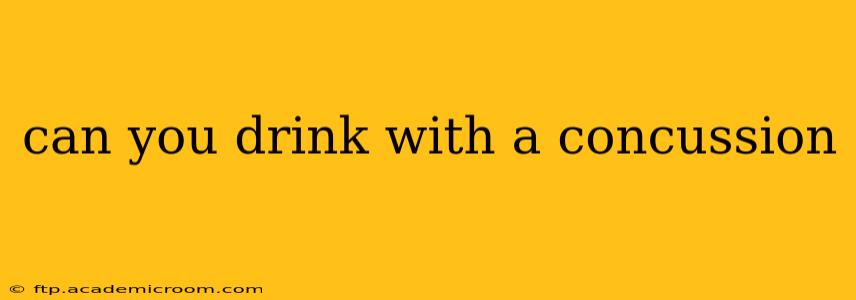Can You Drink Alcohol With a Concussion? A Definitive Guide
A concussion, also known as a mild traumatic brain injury (mTBI), is a serious injury that disrupts the normal function of your brain. While the symptoms can vary widely from person to person, the crucial thing to remember is that drinking alcohol after a concussion is strongly discouraged and can significantly worsen your recovery.
This isn't just a matter of avoiding a hangover; alcohol interacts with your brain in ways that hinder the healing process following a concussion. The effects can be severe and long-lasting.
What Happens When You Drink Alcohol After a Concussion?
Alcohol is a depressant, meaning it slows down brain activity. After a concussion, your brain is already working overtime to repair itself. Adding alcohol to the mix further slows this process, potentially leading to:
- Increased inflammation: Alcohol can exacerbate inflammation in the brain, delaying recovery and potentially worsening symptoms.
- Prolonged symptoms: Headaches, dizziness, nausea, and cognitive issues like memory problems and difficulty concentrating may last longer and be more intense.
- Increased risk of complications: In rare cases, alcohol consumption after a concussion can contribute to more serious complications, including post-concussion syndrome (PCS). PCS involves persistent symptoms that can significantly impact daily life for months or even years.
- Slower healing: Alcohol interferes with the body's natural healing processes, impacting the repair of brain cells and tissues.
What are the Symptoms of a Concussion?
Recognizing the symptoms of a concussion is crucial for seeking appropriate medical care and avoiding risky behavior like alcohol consumption. Symptoms can appear immediately or develop over time and can include:
- Headache: Often described as a dull ache or throbbing sensation.
- Dizziness: Feeling lightheaded or unsteady.
- Nausea and vomiting: Feeling sick to your stomach.
- Confusion: Difficulty concentrating or remembering things.
- Memory problems: Forgetting recent events.
- Sensitivity to light and sound: Feeling overwhelmed by bright lights or loud noises.
- Sleep disturbances: Difficulty sleeping or sleeping too much.
- Mood changes: Irritability, anxiety, or depression.
How Long Should You Avoid Alcohol After a Concussion?
There's no definitive timeframe for avoiding alcohol after a concussion. It's best to abstain completely until you've received clearance from a doctor. Your recovery time will depend on the severity of your injury and your individual response to treatment. Your doctor can assess your progress and advise you when it's safe to resume alcohol consumption, if at all.
Does Alcohol Affect Concussion Recovery Time?
Yes, alcohol can significantly prolong concussion recovery time. By hindering the brain's natural healing process and potentially increasing inflammation, alcohol can delay the resolution of symptoms and increase the risk of long-term complications.
Can You Drink Alcohol While Taking Concussion Medication?
Many concussion medications can interact negatively with alcohol, increasing the risk of side effects. Always check with your doctor or pharmacist before mixing alcohol with any medication, including those prescribed for concussion treatment. The interaction could be dangerous.
What Should You Do if You Suspect a Concussion?
If you suspect you've suffered a concussion, seek medical attention immediately. A healthcare professional can assess your injury, provide appropriate treatment, and advise you on the best course of action for recovery, including recommendations regarding alcohol consumption.
In summary, avoiding alcohol entirely during concussion recovery is essential for optimal healing and minimizing the risk of long-term complications. Prioritizing your brain health is paramount, and consulting your doctor before making any decisions about alcohol consumption is crucial. Remember, your health is your responsibility, and making informed choices will significantly impact your recovery journey.
